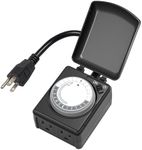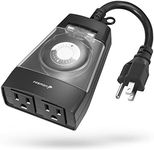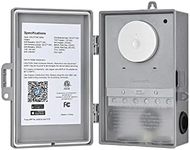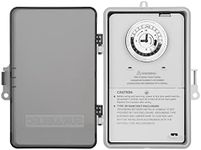Best Pool Pump Timers
From leading brands and best sellers available on the web.
BN-LINK
BN-LINK 24 Hour Heavy Duty Mechanical Timer, Timer Plug with 15 Minutes Intervals, 2 Grounded Outdoor Timer for Christmas Lights,15A 1/2HP, ETL Listed

Intermatic
Intermatic T104 Electromechanical Timer Switch - Proven Durability, 40A Load Capacity, Versatile Scheduling, 1-12 Cycles Per Day - Manual Override, Tripper Included for Reliable Time-Based Control

Fosmon
16%OFF
Fosmon Outdoor Timer Outlet Waterproof, Outdoor Pool Pump Timer, Outdoor Light Timer Weatherproof, 24 Hour Mechanical Heavy Duty Plug in Timer with 2 Grounded Outlets, 15A, 3-Prong, ETL Listed

Dewenwils
22%OFF
DEWENWILS Pool Timer, WiFi Pool Pump Timer, Heavy Duty 40A 120-277 VAC 2HP Wireless Controller Timer for Pool, Water Heater, Works with Alexa, Google Assistant, Smart Life, ETL Listed

GE
GE Heavy-Duty 7-Day Digital Box Timer Switch, Metal, Tamper Resistant, Battery Backup, Universal Voltage, 120, 240, 277 VAC, NEMA 3R-Rated, Indoor/Outdoor, Ideal for Pool Pumps, Water Heaters, 46537

Intermatic
Intermatic P1101 15 Amps Outdoor Pool Timer

Dewenwils
DEWENWILS Pool Pump Timer, Mechanical Timer Box Outdoor, Heavy Duty 2HP 40A 120-277 VAC, 24-Hour Programmable ON/Off Timer Switch for Water Heater, Pool Pump, ETL Listed Gray

K KASONIC
Kasonic Outdoor Timer Outlet, 24 Hour Mechanical Timer Switch, Heavy Duty Water Resistance with 2 Grounded Outlet, ETL Listed (Black)

SURAIELEC
Suraielec Pool Timer, 24-Hour Cycle Mechanical Timer Switch, 40 AMP, 2HP, 120, 240, 277 VAC, Outdoor Indoor Heavy Duty Pool Controller Timer Box for Pool Pump, Water Heater, Spa, Powerful Appliances







